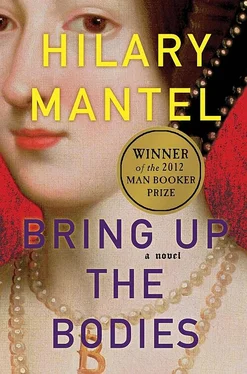Fitzwilliam is one of Henry’s old friends, a man of his own age: too capable by nature, thank God, to panic and gibber. ‘Her keepers are Boleyns,’ Fitz says. ‘I don’t know if they’ll yield her.’
Yes, and what a fool I was, he thinks, not to get among them and suborn them and advance-bribe them for an occasion such as this; I said I would send my ring for Katherine’s deliverance, but for the princess I made no such arrangement. Let Mary remain in the hands of the Boleyns, and she is dead. Let her fall into the hands of the papists, they will set her up as queen, and I am dead. There will be civil war.
Courtiers are now pouring into the tent, all inventing how Henry died, all exclaiming, denying, lamenting; the noise rises, and he grips Fitz’s arm: ‘If this news gets up-country before we do, we will never see Mary alive.’ Her guardians will not hang her up from the staircase, they will not stab her, but they will make sure she meets with an accident, a broken neck on the road. Then if Anne’s unborn child is a girl, Elizabeth is queen, as we have no other.
Fitzwilliam says, ‘Wait now, let me think. Where is Richmond?’ The king’s bastard, sixteen years old. He is a commodity, he is to be reckoned with, he is to be secured. Richmond is Norfolk’s son-in-law. Norfolk must know where he is, Norfolk is best placed to lay hands on him, bargain with him, lock him up or turn him loose: but he, Cromwell, does not fear a bastard boy, and besides, the young man favours him, in all their dealings he has buttered him like a parsnip.
Norfolk is now buzzing from side to side, a maddened wasp, and as if he were a wasp the onlookers shrink from him, eddying away, then swaying back. The duke buzzes into him; he, Cromwell, bats the duke away. He stares down at Henry. He thinks he has seen, but it might be fantasy, a twitch of an eyelid. It is enough. He stands over Henry, like a figure on a tomb: a broad, mute, ugly guardian. He waits: then he sees that flicker again, he thinks he does. His heart lurches. He puts his hand on the king’s chest, slapping it down, like a merchant closing a deal. Says calmly, ‘The king is breathing.’
There is an unholy roar. It is something between a moan and a cheer and a wail of panic, a shout to God, a riposte to the devil.
Beneath the jacket, within the horsehair padding, a fibrillation, a quiver of life: his hand heavy and flat on the regal breast, he feels he is raising Lazarus. It is as if his palm, magnetised, is drawing life back into his prince. The king’s respiration, though shallow, seems steady. He, Cromwell, has seen the future; he has seen England without Henry; he prays aloud, ‘Long live the king.’
‘Fetch the surgeons,’ he says. ‘Fetch Butts. Fetch any man with skill. If he dies again, they will not be blamed. My word on that. Get me Richard Cromwell my nephew. Fetch a stool for my lord Norfolk, he has had a shock.’ He is tempted to add, throw a bucket of water on Gentle Norris: whose prayers, he has time to notice, are of a marked papist character.
The tent is now so crowded that it seems to have been picked up by its moorings, to be carried on men’s heads. He takes a last look at Henry before his still form disappears under the ministrations of doctors and priests. He hears a long, retching gasp; but one has heard the same from corpses.
‘Breathe,’ Norfolk shouts. ‘Let the king breathe!’ And as if in obedience, the fallen man takes a deep, sucking, scraping breath. And then he swears. And then he tries to sit up.
And it is over.
But not entirely: not until he has studied the Boleyn expressions around. They look numb, bemused. Their faces are pinched in the bitter cold. Their great hour has passed, before they realised it has arrived. How have they all got here so fast? Where have they come from? he asks Fitz. Only then he realises that the light is fading. What felt like ten minutes has been two hours: two hours since Rafe stood in the doorway, and he dropped his pen on the page.
He says to Fitzwilliam, ‘Of course, it never happened. Or if it did, it was an incident of no importance.’
For Chapuys and the other ambassadors, he will stick by his original version: the king fell, hit his head, and was unconscious for ten minutes. No, at no time did we think he was dead. After ten minutes he sat up. And now he is perfectly well.
The way I tell it, he says to Fitzwilliam, you would think that the blow on the head had improved him. That he actually set out to get it. That every monarch needs a blow on the head, from time to time.
Fitzwilliam is amused. ‘A man’s thoughts at such a time hardly bear scrutiny. I recall thinking, should we not send for the Lord Chancellor? But I don’t know what I thought he was to do.’
‘My thought,’ he confesses, ‘was, somebody get the Archbishop of Canterbury. I think I believed a king couldn’t die without his supervision. Imagine trying to bustle Cranmer across the Thames. He would make you join him in a gospel reading first.’
What does the Black Book say? Nothing to the purpose. No one has made a plan for a king struck down between one moment and the next, one second mounted tall and riding full tilt, next second mashed into the ground. No one dares. No one dares think about it. Where protocol fails, it is war to the knife. He remembers Fitzwilliam beside him; Gregory in the crowd; Rafe by his side, and then Richard his nephew. Was it Richard who helped lever the king upright as he tried to sit, while the doctors cried, ‘No, no, lie him down!’ Henry had clasped his hands to his chest, as if to squeeze his own heart. He had struggled to rise, he had made inarticulate noises, that sounded like words but were not, as if the Holy Ghost had descended upon him and he was speaking in tongues. He had thought, panic darting through him, what if he never makes sense again? What does the Black Book say if a king is rendered simple? Outside he remembers the roaring of Henry’s fallen horse, struggling to rise; but surely that cannot be what he heard, surely they had slaughtered it?
Then Henry himself was roaring. That night, the king rips the bandage from his head. The bruising, the swelling, is God’s verdict on the day. He is determined to show himself to his court, to counter any rumours that he is mauled or dead. Anne approaches him, supported by her father, ‘Monseigneur’. The earl is really supporting her, not pretending to. She looks white and frail; now her pregnancy shows. ‘My lord,’ she says, ‘I pray, the whole of England prays, that you will never joust again.’
Henry beckons her to approach. Beckons her till her face is close to his own. His voice low and vehement: ‘Why not geld me while you are at it? That would suit you, would it not, madam?’
Faces open in shock. The Boleyns have the sense to draw Anne backwards, backwards and away, Mistress Shelton and Jane Rochford flapping and tut-tutting, the whole Howard, Boleyn clan closing around her. Jane Seymour, alone of the ladies, does not move. She stands and looks at Henry and the king’s eyes fly straight to her, a space opens around her and for a moment she stands in the vacancy, like a dancer left behind when the line moves on.
Later he is with Henry in his bedchamber, the king collapsed in a velvet chair. Henry says, when I was a boy, I was walking with my father in a gallery at Richmond, one night in summer about eleven of the clock, he had my arm in his and we were deep in talk or he was: and suddenly there was a great crashing and a splintering, the whole building gave a deep groan, and the floor fell away at our feet. I will remember it all my life, standing on the brink, and the world vanished from beneath us. But for a moment I did not know what I heard, whether it was the timbers splintering or our bones. Both of us by God’s grace still stood on solid ground, and yet I had seen myself plummeting, down and down through the floor below till I hit the earth and smelled it, damp like the grave. Well…when I fell today, that was how it was. I heard voices. Very distant. I could not make out the words. I felt myself borne through the air. I did not see God. Or angels.
Читать дальше
Конец ознакомительного отрывка
Купить книгу












